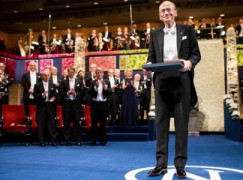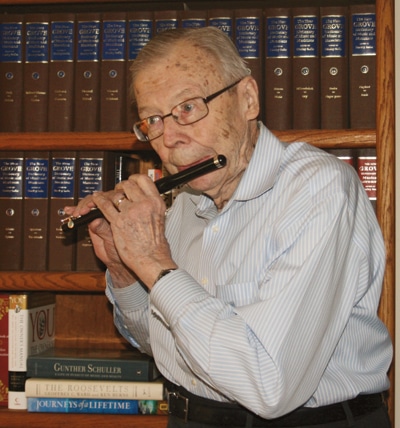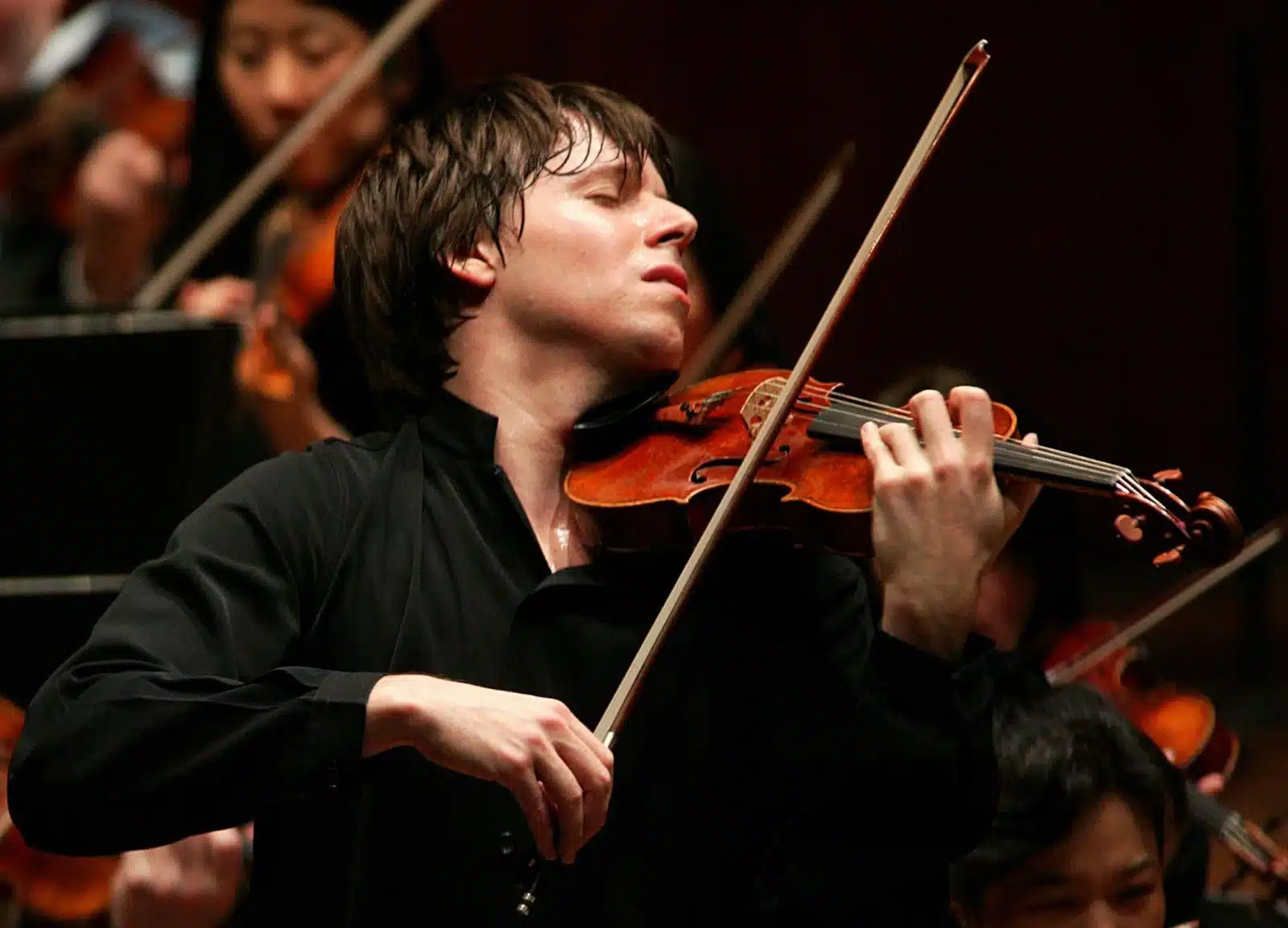Exclusive: Nobel Winner says ‘In the US, classical music is fundamentally a dying art’
mainIn October 2013, we reported that the winner of the Nobel Prize for Medicine, Thomas Südhof, had said that he owed it all to his bassoon teacher. On the basis of that reported comment, Dr Südhof has given an exclusive interview at Stanford to Ryan Romine of The Double Reed, discussing his own musical education and the importance of music in training the scientists of the future. With Ryan’s permission, we publish the following extracts:

Ryan Romine (RR): In comments you made in the Lancet in 2010 and others recently
posted by Norman Lebrecht of Slipped Disc, you credited your bassoon teacher with
teaching you valuable skills for your career. Can you expand on those earlier comments
about your musical training and its impact on your research skills?
Thomas Südhof (TS): The qualities I learned from my training in classical music, in
particular in bassoon, are multifarious and varied. Let me list a few. First, the value of disciplined
study, or repetitive learning, for creativity. You cannot be creative on a bassoon if
you don’t know it inside out, and you cannot be creative in science if you don’t have a deep
knowledge of the details. Second, the value of good mentorship. A good teacher challenges
and criticizes, but does not chastise or put down a student, no matter what. !ird, the role
of performance in a profession. As a musician, you practice for thousands of hours to play
for a few minutes—but when you play, you have to not only recapitulate the learned material,
you have to expand on it and you have to communicate it to the audience. In science, it is
basically the same thing—it is in the end a process which also depends on communicating
with an audience and accepting and responding to its feedback. Finally, I learned to value
traditions as a musician, but at the same time the importance of trying to transcend tradition.
The tradition is the basis that allows you to progress, the starting point, but it cannot
become a limitation, because then both in music and in science creativity and progress end.
*
RR: How do your children’s musical experiences in the US compare with your own childhood
musical experiences in Germany?
TS: I think the US offers terrific opportunities for young children to learn classical music. I only
wish there were more opportunities [for them] to go to concerts and to perform in concerts.
RR: Do you feel there is a cultural/temporal/geographical/neurological difference in
how art music is perceived and valued in the present society in comparison to when you
were growing up?
TS: Absolutely—in the US at the present time, classical music is fundamentally a dying art.
There are few people who are willing to pay for it and its importance is miniscule compared
to that of popular sports. Musicians earn a fraction of what even a mediocre athlete earns.
There is no vibrant musical culture at present—everything is geared towards being commercially
successful, not towards content. However, I think the same trend is observed in
Europe, and we need to accept this trend and look for components in popular culture that
are not boring (sometimes quite hard for me).
RR: Would you encourage your children to become musicians, scientists, both, neither?
TS: Only if they have a passion for it—it is a lot easier to have a stable life and to support a
family in other professions. Being a musician or a scientist is a sacrifice, and only worth it
if you truly enjoy it and consider it a privilege.
*
RR: The American education system has in the past few years invested heavily in STEM
(Science, Technology, Engineering, Mathematics) subjects, which place a significant
emphasis on your career field. Yet, your earlier published statements place significant
value on arts training. Do you see any way to integrate these two seemingly disparate
ideals?
TS: I personally think that training in the arts prepares a growing child just as well for a
scientific or technical career as [does] training in STEM subjects, if not better, because the
arts train a person in discipline, independent action, thinking, and in the need for attention
to detail without becoming a prisoner of that detail. I absolutely don’t think there is a need
for earlier math training—there is only a need for training the mind so it becomes fertile
for future learning.
*
RR: Do you still own/play a bassoon?
TS: I still own my bassoon—upstairs in a cupboard—but I don’t play it any more….
RR: Who is the maker?
TS: Hüller, a former East-German company.
*
RR: Thank you so much, Dr. Südhof, for your time and your thoughts. Bassoonists (and
musicians in general) worldwide are surely proud to count you as one of their own.
TS: I wish I could still be a bassoonist—it was a lot harder than being a scientist.





It is a bit sobering when I attend concerts in the U.S. and find that I am surrounded only by two classes of people: young iPhone-sporting Asians (thank goodness for them, BTW); and blue-haired, cane-wielding geriatrics (and thank goodness for them too, given that they’re probably the primary donors). Others are apparently at the mall.
While you have a point, there are some positive exceptions. I’ve observed that if you want to attract more than a token number of young people, either make the concert free (or heavily discounted), or play more modern/unusual music. Or both.
I’ll note that at the Dallas Symphony Concerts I’ve been to over the past few seasons there are a detectable number of younger patrons (white and black, in addition to iPhone Asians). Certainly more than I noticed 10 or 20 years ago.
The ticket prices haven’t gone down, the repertoire is still the same conservative warhorses… I’m not sure what they are doing differently aside from the marketing campaign looking a bit less upscale and their having launched an unpretentiously curated Facebook account a few years ago.
The appointment of greatly gifted Jaap van Zweden as principal conductor has certainly something to do with greater audience commitment. And he programs an unusual, new piece regularly.
Indeed, once a year does qualify as “regular”
Anecdotally, I know various people in their 20s, 30s, and 40s who like (or claim to like) classical music. They seldom or never go to live concerts, and seldom or never buy recordings. Almost all of their exposure to classical is via radio or the Internet. It’s hard to get a fix on how large this audience of “casuals” is, but it may be very large indeed.
I love classical music, and have for 50 years both as a listener and as a performer. But I find myself going to fewer concerts each year – and there are many where I live. Why? Tickets are not cheap, I’m tired of dealing with traffic and parking, I am annoyed at people who talk or rattle candy wrappers, I’m bored with the same repertoire over and over… But I can stay home, listen to a high quality sound system and let the greatest artists ever play for me. If it’s opera, I can watch it in Blu Ray and get a better seat than I can afford at the opera house. It is sad that very few AMericans seem to know much or care about the classics. There’s lots of blame to go around. But you know, many art forms die out eventually. Country star Clay Walker recently said that country/western is dead – and he’s right. It’s morphed into a rock with cowboy boots and a hat. The folk music renaissance in the 60s has gone away. It’s sad, and I think classical music improves your life. Maybe if just once a national leader were to indicate he likes classical that people might try it. But our current hip-hop fan in the White House has said he knows nothing about classical and doesn’t like it. Richard Nixon, for all his faults, loved classical.
I agree with everything you say about the reasons NOT to attend live concerts. All those factors have to be taken into account. Also a lot of people are put off by the “formality” (real or imagined) of the concert hall format – they think incorrectly that you have to wear a suit, and so on.
If classical is dying it has a lot of company: not only country and folk as you mention, but also jazz (which has even lower sales than classical). Complex instrumental music of whatever type just seems to turn off most people. Rock, while it continues to sell, is getting increasingly geriatric as to both its performers and its fans.
BTW “our current hip-hop fan in the White House” back when he was a candidate, indicated that he listened to Bach cello suites on his iPod. Probably his image-makers told him to stop doing so, lest he be seen as “elitist.”
In short, humanist education has been replaced with specialist education.
Homo sapiens no more. Homo faber all the way.
The Beethovenfest Bonn in Germany has doubled its audience in the last decade under the direction of Ilona Schmiel. She used imaginative programming, alternative venues (like factories, churches, museums) and invited unconventional and provocative soloists. L.F.
It is regrettable that European classical music is increasingly experienced as something alien to US society, which says a lot about its stony soil for culture from the continent that could have enriched it immensily. Cultural education is not entertainment, but character-forming, as the nobel prize winning bassoonist shows. WIld capitalism and materialism in an egalitarian society produces a new human type: the modern cave man.
Hmm. “Wild capitalism and materialism”–at least during the era of the “robber barons” when there was an immense gap between rich and poor–funded many concerts halls, e.g., Carnegie, and a great number of libraries and museums. The North American continent at that time enriched culture immensely, while many of the less fortunate worked long hours and did without. But in our more egalitarian modern era, it does seem to follow that the tastes of the masses prevail. Would that U.S. schools would inculcate a love of European music and art in the young as they once did; increasingly, though, they seem even to denigrate European achievements, lauding instead indigenous cultures and peoples for their perceived “victimhood” at the hands of Europeans and their descendants.
True…. that is the influence of cultural relativism, and the (wrong) idea that democracy means that everything and everybody is the same, indeed the egalitarian world view which is a form of civilizational suicide. But the liberation of the underprivileged masses everywhere in the world should, in due course, lead to an awareness of the importance of culture. Maybe just another hundred of years and…
Man, you talk like you are mentally stuck in the 70s…
No, you didn’t get the point: from the seventies onwards this cultural relativism became the established norm and now we see the desastrous results of it.
Classical music is, like all artistic endeavors of quality, something hierarchical, and thus it is now under threat in an egalitarian society.
That’s what I meant! “Cultural relativism” – that’s soooo 70s. And what’s currently going on in the US with education and the arts – the subject of this discussion – has nothing to do with any of that. It’s because the country has been plundered by big finance and big corporations and there is simply not enough money anymore for arts and education in the hands of those who would spend it on such things.
The current US society isn’t “egalitarian” at all – it is extremely hierarchical, with the income inequality getting worse and worse all the time.
Yes, economically it may be hierarchical, but I was talking about what is going-on in people’s minds. If in the US the rich get ever richer, why is it that orchestras are closing down and/or merging? Opera companies get bankrupt? Art programmes cut? etc. etc. If people – for instance, rich people – get the idea that there is no such thing as ‘classical music’ that is representing something of value in itself, but is supposed to be merely an outdated entertainment form for geriatric purposes, they will prefer to sponsor sport events rather than music.
‘Cultural relativism’ has really become a standard approach in politics, social sciences, education (where resentment of the underprivileged is taught rather than things of cultural value which would help the underprivileged to improve their condition). It’s like the fish who don’t know they are swimming in water… so many people in positions that should know better, have no idea they are acting as if they were living in the seventies. Read Alain Finkelkraut: ‘The Defeat of the Mind’, 1987: still VERY to the point and revealing the myths hidden under the surface of modernity.
I know a lot of bassoon players personally, but none of them are Nobel Prize winners.
My brother is the principal percussionist with the Los Angeles Philharmonic. When their tour reached New York last summer I tried to get tickets to hear them but I could not afford the hefty price for my family of four. This felt wrong to me, not just for me but for all the other modest middle class families that miss out on one of the indelible joys of life. To experience music the moment it is bowed, blown & struck. To be in the presence of the energy vibrating throughout the hall is to make oneself available to the magic! I’m all for new programming but I’m reminded that someone in the audience is hearing Stravinsky for the very first time.
Your brother is awesome!
Dr. Südhof’s experience certainly doesn’t match what I’ve seen in Cleveland. Quite unlike the plethora of blue hairs I saw during my Boston years, the audiences at Severance Hall are diverse both in terms of age and ethnicity – with a healthy dose of students, both Asian and non. I’ve also noticed subtle shifts of demographics based on the repertoire/performers on the program. For example, a program featuring Prokofiev’s Alexander Nevsky was heavily attended by the local Russian emigre populace.
In fact, the oldest audience I’ve seen at Severance lately was for an Aretha Franklin concert (she was accompanied by the Cleveland Institute of Music Orchestra). At 46, I was one of the youngest people there!
In the US our education system has been taken over by corporate interests who are interested in creating obedient workers rather than questioning citizens. Music, literature and the arts are fundamental to creating a well rounded citizen, so those areas are pushed out. We must resist this at every step and remind ourselves what the true purpose of education is.
I find that young people are hungry for the arts. I try to promote great music through a “Listeners’ Club” at my blog for anyone who is interested: http://www.timothyjuddviolin.com/blog/
In the US our K-12 education system has been taken over by educational interests more interested in raking in more funding rather than turning out educated students; in constant dollars, per student spending has increased fourfold in the last 40 years with no improvement in performance. If, as you say, music, literature and the arts are being pushed out, you’d better ask yourself where all that money is going.
I’m sure these mean, nasty corporations who just want obedient workers also want ones that can write a coherent sentence or do simple math. Too often they find that our education system can’t even turn out those.
That “healthy dose” of students you see at Cleveland Orchestra concerts is likely mostly comprised of music students, enrolled at CIM or Case Western Reserve University. In other words, people already involved in the profession and who are subsidizing it from within. Although I wouldn’t discount the appeal of $10 student tickets to the non-musician population at Case either.
Classical music is in transition, to be sure. Smaller companies doing much more vibrant and interesting work. But there is still quite a lot of it, perhaps more than in recent years – just not in the same places. If you look in those same places, you may be disheartened, but look a little further and you may be happily surprised.
While waiting for the American visa in Munich in 1976 I had a charming life- giving a few concerts,accompanying ..My friend at that time,Nicolas Economou,warned me not to go and stay in Europe but I thought in US will be more opportunities .I was wrong- for a long time I had to drive a cab in New York.
In spite of many problems, the best places for classical musicians to be in the world, are China and Middle-Europe. Italy and Spain hardly have money for classical music, France thinks there are only classical musicians in France, in England musicians struggle along the economic abyss, in Holland classical musicians are either locked-up or deported to the islands in the north – but in Germany and Austria classical music is part of the nation’s cultural identity. They will long remain islands of musical civilization, in spite of shrinking funds, also there. Recently I was in Vienna where, although the financial crisis creates problems for everybody, music lovers will cut on anything EXCEPT concerts because that is a crucial part of their lives. Quite a lesson for the rest of the Western world.
During the ‘Golden years’ of classical music (Bach to Beethoven) most were illiterate. What we now call classical music was accessible only to the privileged few. The argument that declining values or dumbing down of the proletariat has some problems.
The market, (ultimately, the need that music fills) in this age of instant global interconnection is about “what am I in the mood for, gimme now!” instead of “XYZ is coming to town, I will go listen, it might bring me pleasure”.
This results in a rapid pull model replacing a slow push model.
Marketing by the musician needs to reflect this change. Who knows how to do this? Not me.
But I am trying to understand the question.
That art music, ‘classical’ music, became accessible to bourgeois (19C) and workers (20C) was great progress. That accessibility now shrinks again, is regression, and all the more telling while it has become very easy to access it, thanks to modern media. (There is a term for it: decadence.)
The contemporary butterfly attention span is a warning sign of regression and this affects more fields of experience than music alone. Marketing classical music could be best done in the way of: here we can learn how to focus, to concentrate our thoughts, to become aware of long-structure and foreground-background space, which will help us elsewhere in life to achieve things. So, an interesting challenge for the educational institutions…… and for contemporary composers, of whom many seem to suffer from the very same regression, incapable of liberating themselves from the influence mind numbing pop music.
How does accessibility shrink again??? It’s the opposite, classical music has never been more accessible than today. What is shrinking is the quantity of educated curious minds in western decadent societies.
Yes, I think you’re right. The shrinking is now on the other side.
I am currently producing a micro-budget, independent film on this very topic called “School Jazz: the Art of Education”. How do I contact Mr. Lebrecht or Thomas Südhof to talk about accessing video of the interview or shooting another for the fim? Find out more about the film on http://www.schooljazzfilm.com
thanks
Kyrl Henderson, Producer, Director, Editor (you get the idea…)
p.s. If anyone would like to see a preview edit of the film or be included in a “feedback loop” :>) about the film and edits, just email kyrl@kyrl.com
“..There is no vibrant musical culture at present—everything is geared towards being commercially successful, not towards content However, I think the same trend is observed in
Europe, and we need to accept this trend …”
I disagree with the first part but I do agree that commercial success has become the big American trend of late. I don’t see why anyone has to accept this trend.
http://philipfried.blogspot.com/2014/01/on-money.html
I agree with the first part (your disagreement), there is a vibrant music culture. Music demands it. But with respect to your second point, I think that it’s as much about survival as “commercial success”. Having been a working “pop” musician in the 70s, we were able to get by on what we made playing. The same is not true for my son now. There is no proving ground or social infrastructure (clubs, etc.) that supports musicians at the bottom rungs. I know guys that are scary good, in all musical genres, that supplement their playing income with piano tuning, or another second or third job. Being able to support yourself and family and eat is not optional. If you derive your income from a University or other academic institution, then you can buck the trend. God help those who don’t achieve a certain amount of notoriety and still must rely on their music for their livelihood. It gets down to what we value as a society, and we vote with our wallets.
I don’t agree that there is no vibrant music culture or that no one cares about content. The classical music culture is shifting to the grassroots level, to smaller companies where they can truly reach people. The big opera houses and concert halls seems forbidding to many young people, as do the prices.
As one example, this is a company I have and do strongly support. They are recording a CD – they are young and energetic and it’s all new music. The CD label seems to be run by a young group, also. Tell me this isn’t vibrant, or that it’s without concern for content.
https://www.facebook.com/pages/Juventas-New-Music-Ensemble/100953676615649